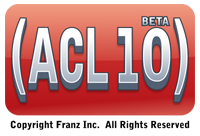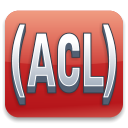In this issue
- Allegro CL 10.1 - Call for Beta Testers
- Tech Corner Article: The New Interface to OpenSSL
- 10th European Lisp Symposium - April 2017 Brussels
- The Express Version's Expiration Date has been Updated
- KM World article - How does precision medicine become a reality?
- ODBMS Industry Watch article - On data analytics for finance. Interview with RavenPack's Jason S.Cornez
- Building a Fun Ethereum Game, by Conrad Barski
- Recent Articles about Franz - AllegroGraph
- Follow us on Google Plus, Twitter, LinkedIn, and YouTube
- Training Schedule
Allegro CL 10.1 - Call for Beta Testers

ACL 10.1 New Features
|
Users interested in becoming beta testers should contact info@franz.com for more information.
Tech Corner Article: The New Interface to OpenSSL

The interface between Allegro CL and OpenSSL was significantly changed in updates released in July, 2016. Before the update, an OpenSSL library was included with the Allegro CL distribution and newer OpenSSL libraries had to be included in an Allegro CL update before they could be used. Now, OpenSSL libraries are loaded dynamically on startup so Allegro CL and its applications can benefit from new releases as soon as they become available.
See The new interface to OpenSSL for more information about this change.
The 10th European Lisp Symposium, April 3-4, Brussels, Belgium

The purpose of the European Lisp Symposium is to provide a forum for the discussion and dissemination of all aspects of design, implementationand application of any of the Lisp and Lisp-inspired dialects, including Common Lisp, Scheme, Emacs Lisp, AutoLisp, ISLISP, Dylan, Clojure, ACL2, ECMAScript, Racket, SKILL, Hop and so on. We encourage everyone interested in Lisp to participate.
This year's ELS will be co-located with the Programming 2017 Conference!
For additional information about the conference, see here.
The Express Version's Expiration Date has been Updated

The original 10.0 Express expired on 2016-12-16. Downloads after August 15, 2016 include a license that expires on 2017-12-16. If you downloaded prior to August 15, 2016 and do not wish to download the new version, you can download just the new devel.lic and replace your current one with this new version. Look in your devel.lic for the Expiration date to find out if you need to update it. If you are not running version 10.0, then please download the latest Express version.
See here for additional information and to download the software.
KM World article - How does precision medicine become a reality?

One of the prominent problems plaguing the current healthcare system is the narrow scope of patient data used to facilitate most aspects of care, from initial diagnoses to treatment. According to Dr. Parsa Mirhaji, director of clinical research informatics at Montefiore Health System and Albert Einstein College of Medicine, the vast majority of research findings are based on averages of middle-aged white males: "We don't really know much about women, other ethnicities, children, you name it - there's no evidence," he says.
The White House launched The Precision Medicine Initiative in 2015 as a means of redressing the situation and expanding the breadth of patient data to personalize treatment for individuals and historically underrepresented groups. Achieving that objective requires not only amassing patient-specific data for wider demographics, but also storing, accessing and analyzing them with a number of avant-garde data management technologies...
See here to read the full article.
ODBMS Industry Watch article - On data analytics for finance. Interview with RavenPack's Jason S.Cornez

Roberto V. Zicari interviews RavenPack's Chief Technology Officer - "Understanding human language remains a difficult problem. The challenges here are not only technical, but there is also a perception from popular culture that computers today perform at the level we see in science fiction. So there is a gap between what is expected and what is possible." - Jason S.Cornez.
Visit here to read the full article...
Building a Fun Ethereum Game, by Conrad Barski

Conrad Barski is building a Fun Ethereum Game. (Author's note: The goal of this series of posts will be to build a minimally viable multiplayer game on the ethereum blockchain, with support for scarce resources and appropriate protections against economic attacks.) Edwalt had finally found the nightshade, obsidian vapors, and mantis mushrooms he needed to open the magic portal into the next realm...
Visit his website to get in the game...
Recent Articles about Franz - AllegroGraph
 |
|
 |
|
 |
|
 |
|
 |
|
 |
|
Follow us on Google Plus, Twitter, LinkedIn, and YouTube
Training Schedule
 BECOME ALLEGRO CERTIFIED - To obtain your Allegro CL Certification enroll in our LIVE Program which offers developers an opportunity to learn and improve their Lisp programming skills from the comfort of their home or office while interacting with the Franz instructor.
BECOME ALLEGRO CERTIFIED - To obtain your Allegro CL Certification enroll in our LIVE Program which offers developers an opportunity to learn and improve their Lisp programming skills from the comfort of their home or office while interacting with the Franz instructor.
Lisp Programming Series Level I: Basic Lisp Essentials - Feburary 8, 15, and 22
Lisp Programming Series Level II: Specialized Components of Lisp - March 8, 15, and 22
For additional information and to register, see here.



